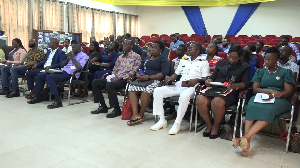The 8th module of the Support to West Africa Integrated Maritime Security (SWAIMS) Project has been held at the Regional Maritime University.
The EU-funded project is a nine-module program which consists of Introduction to Maritime Security Environment, Maritime Security Functional Areas, Legal and Police Frameworks for Advancing Maritime Security, Blue Economy and Maritime Environment, and Maritime Crisis Management, among others.
Module 8, which seeks to address the complexities of safety and security in the marine space, had participants from the Navy, Maritime Administration, Port Authority, Marine Police, and even judges drawn from countries like Ghana, Togo, Cote d'Ivoire, and Niger.
An Electrical Engineer and an alumnus of the Regional Maritime University, Jewel Ahiable, who was a speaker at the program, emphasized the need for enhanced security and safety in the maritime space as he shared his experience as a captive for 1000 days after their vessel was hijacked by Somali Pirates in the Gulf of Guinea.
“We realized that our captain tried to do defensive manoeuvring and within about 15 minutes, everything subsided and our bosun came and shouted, 'Colleagues come out, come out, your ship has been hijacked by Somali pirates' and we came out from our hideout. We climbed to the officers’ deck and on our way to the bridge, we saw these pirates wielding an AK-47 and he asked us to put our hands on our heads. So, after 2 years, 9 months, 1,000 days, for the first time, we stepped our feet on land on the 23rd of December 2012,” he narrated.
He stated that fire, ship grounding, sinking, explosion, collision, and armed robbery or piracy are some dangers that are likely to happen in the maritime space and urged vessel crew members to always adhere to security measures while on board.
“In the marine space, there are a lot of happenings, there is amputation, electrocution, there is corrosion, and a man falling overboard. Some of the major happenings are fire, grounding of the ship, sinking of the ship, and collision,” he said.
The Coordinator of the SWAIMS project, Ing. Augustus Addy-Lamptey, revealed that the module's goal was to help maritime industry actors understand the consequences of maritime crimes.
“Shipping carries about 90% of international trade so if anything affects ships then it's a challenge and you can see Covid times it took shipping to let the wheels of Industry run. So this particular program was set up to make sure that the actors in the maritime industry appreciate the main effect of maritime crime and this has more to do with kidnapping for ransom,” he said.
He added that the module thrived on collaboration and cooperation and urged for interagency collaboration among players in the value chain.
“This particular model has to do with collaboration and cooperation. So that is why we have addressed this issue holistically,” he said.
Business News of Saturday, 11 May 2024
Source: Eye on Port

















